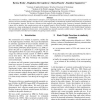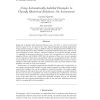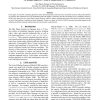96 search results - page 7 / 20 » Discovery of Linguistic Relations Using Lexical Attraction |
106
Voted
COLING
2002
15 years 1 months ago
2002
Broad-coverage lexical resources such as WordNet are extremely useful. However, they often include many rare senses while missing domain-specific senses. We present a clustering a...
100
Voted
LREC
2008
15 years 3 months ago
2008
In this paper, we present a linguistic resource that annotates event structures in texts. We consider an event structure as a collection of events that interact with each other in...
107
click to vote
LREC
2008
15 years 3 months ago
2008
The construction of a wordnet, a labour-intensive enterprise, can be significantly assisted by automatic grouping of lexical material and discovery of lexical semantic relations. ...
125
click to vote
NLE
2008
15 years 1 months ago
2008
Being able to identify which rhetorical relations (e.g., contrast or explanation) hold between spans of text is important for many natural language processing applications. Using ...
LREC
2008
15 years 3 months ago
2008
In this paper, we describe a unifying approach to tackle data heterogeneity issues for lexica and related resources. We present LEXUS, our software that implements the Lexical Mar...



